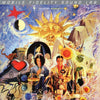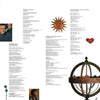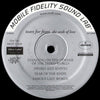











Tears For Fears – The Seeds Of Love (Ultra Analog, Half-speed Mastering, 140g)
ORDER LIMITED TO ONE ITEM PER CUSTOMER
Tears For Fears [click here to see more vinyl featuring Tears for Fears]
Roland Orzabal – lead vocals (A1-3, B1-4), backing vocals, guitars, keyboards, Fairlight programming
Curt Smith – bass guitar, backing vocals, co-lead vocals (A3), lead vocals (A4)
Ian Stanley – keyboards and Hammond organ (A1, A3)
Tessa Niles – backing vocals (A2, B1, B3), female vocal (B2)
Manu Katché – drums (A2, B1) [click here to see more vinyl featuring Manu Katché]
Oleta Adams – keyboards, female vocal (A1-2), acoustic piano (A2, B1), backing vocals (B1)
Nicky Holland – keyboards, backing vocals (A2, A4, B3), acoustic piano (A4, B2, B4), Kurzweil strings (B4)
Simon Clark – keyboards, synthesizers (A2, B1), Hammond organ (A2, A4, B1, B3)
Neil Taylor – guitar (A1), rhythm guitar (B3)
Robbie McIntosh – lead guitar (A2, B3), slide guitar (A2)
Randy Jacobs – guitar
Pino Palladino – bass (A2, B1)
Phil Collins – drums (A1)
Chris Hughes – drums and production (A3)
Simon Phillips – drums (B1)
Luís Jardim – percussion
Carole Steele – percussion (A2, B1)
Richard Niles – orchestral arrangements (A3)
Jon Hassell – trumpet (B1, B3)
Peter Hope-Evans – harmonica (B1)
Kate St John – saxophone (B2), oboe (B2)
Carol Kenyon – backing vocals (A2, B2-3)
Maggie Ryder – backing vocals (A4)
Dolette McDonald – backing vocals (B3)
Andy Caine – backing vocals (B3)
Written by Roland Orzabal (all tracks), Nicky Holland (A2, A4, B2 to B4), Curt Smith (A3)
1 LP, gatefold jacket
Limited numbered edition
Original analog Master tape : YES
Half-speed Mastering
Gain 2™ Ultra Analog
Heavy Press : 140g
Record color : black
Speed : 33 RPM
Size : 12'’
Stereo
Studio
Record Press : unspecified
Label : MOFI
Original Label : Fontana
Recorded 1986–1989
Engineered by David Bascombe, Steve Chase
Mixed by Bob Clearmountain (A1, B3), David Bascombe (A2 to B4)
Produced by Tears for Fears and David Bascombe
Mastered by Bob Ludwig
Originally released in Spetember 1989
Reissued in 2013
Tracks:
Side A:
- Woman In Chains
- Badman's Song
- Sowing The Seeds Of Love
- Advice For The Young At Heart
Side B:
- Standing On The Corner Of The Third World
- Swords And Knives
- Year Of The Knife
- Famous Last Words
Reviews :
“Along with the mega-platinum Songs from the Big Chair, The Seeds of Love rendered Tears for Fears one of the '80s most successful pop groups. The album was created during a profound period of catharsis. Curt Smith was going through a divorce while Roland Orzabal was in primal therapy. Musically, it's their most sophisticated outing, and it should be: It took four years, four producers, and over a million pounds to complete. The duo sought to distance themselves from the synth pop of their earlier records in favor of a more organic approach using live musicians. Included in this all-star cast are Kate St. John, Jon Hassell, Robbie Macintosh, and Ian Stanley.
Orzabal began writing in 1985 with touring keyboardist Nicky Holland and continued in London in 1986. Their collaboration netted half the album's tracks, including "Bad Man's Song." Due to outside pressures, Smith's only co-writing credit is the soaring title track, though he played, sang, and advised on all charts and mixes. The album's Muse is American vocalist/pianist Oleta Adams. Orzabal caught her set in a hotel bar in 1985 and asked her two years later to duet on the transcendent album-opener "Woman in Chains." It set the tone for the entire proceeding. (The glorious drumming on the cut is by Phil Collins.) Adams also contributed gospel vocals to "Bad Man's Song," which features a Holland piano intro strongly suggestive of Weather Report's "Birdland." The presence of drummer Manu Katche and bassist Pino Palladino underscores it. The production chart for "Sowing the Seeds of Love" borrows heavily from the Beatles' "I Am the Walrus," but ends up as a spiritual, sociopolitical anthem in its own sonic universe. Smith's devastatingly beautiful refrain and the brief, seemingly errant entrance of an operatic soprano and a choir, frame the panoramic horns, strings, and Fairlight orchestrations, resulting in one of the duo's most enduring songs. On "Advice for the Young at Heart," Smith's and Holland's vocals entwine in a melody grounded in blue-eyed soul, jazz, and elegant pop that recalls the Style Council. Hassell's fourth world trumpet introduces the lithe "Standing on the Corner of the Third World," clearing the way for a melody that melds Bacharach-esque pop to folk, rock, and chamber jazz, with riveting singing from Smith and Orzabal. "Swords and Knives" melds squalling prog rock guitar (a la Robert Fripp) to Afro-Latin polyrhythms and orchestral arrangements woven through psych-pop overtones. The rave-up rocker "Year of the Knife" is loaded with effects. Its siren-like strings provide ballast for ripping, multi-tracked guitars, samples, atmospherics, punchy drums, and a soul revue chorus. Closer "Famous Last Words" opens with ambient sounds and a lone piano as Orzabal delivers a love song about mortality. Simon Phillips' drumming propels wafting strings and a chorale, before they're stripped away at close. Thanks to the duo's uncompromising stubbornness, expansive creative vision, and Dave Bascombe's final production, The Seeds of Love has dated better than either of its predecessors and is inarguably Tears for Fears' masterpiece.” AllMusic Review by Thom Jurek
Ultra Analog™ : The GAIN 2 Ultra Analog™ Series stems from the use of the Gain 2 system, mastered at half speed from the original master tapes where possible, capturing and uncovering as before undiscovered sonic information.
Half-speed mastering. In half-speed mastering, the whole process is slowed down to half of the original speed. A typical 33 1/3 rpm record is cut at 16 2/3 rpm. The source material is also slowed down (reducing the pitch in the process) meaning the final record will still sound normal when played back. Slowing the whole process down allows more time, which means the end result sounds better and is more efficient — allowing engineering to minimize the effects of inherent limitations within the vinyl format. The result is a more accurate and more open high-frequency response in the half speed vinyl when compared with a normal speed recording.
Ratings :
AllMusic : 4 / 5 , Discogs : 4.6 / 5




